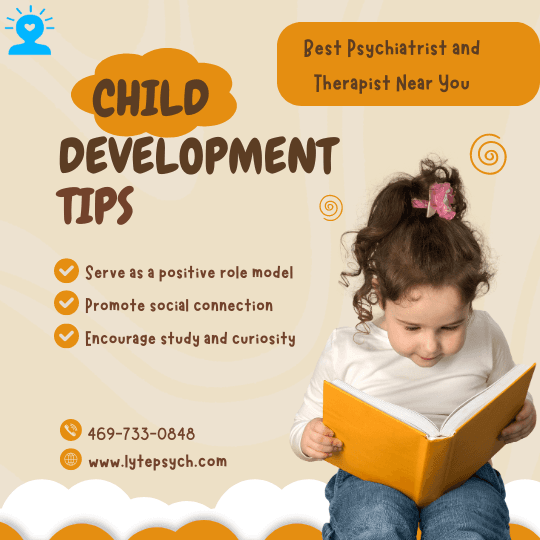Thu Apr 25 2024
Therapy, Child Development and Emotional Support at Lyte Psychiatry (Best Adults & Adolescents Therapist and Psychiatrist), Affordable Therapist and Psychiatrist, Dallas, Fort Worth, TX

Introduction to Therapy and Child Development an Overview from Lyte Psychiatry (Best Adults and Adolescents Therapist and Psychiatrist)
Therapy is an essential component in the healthy development of children and teenagers, providing them with the tools to understand their emotions and the challenges of growing up.
In this article, we will delve into the significance of therapy and emotional support, focusing on the tailored services provided by Lyte Psychiatry, a clinic dedicated to enhancing the mental well-being of young individuals.
Understanding Emotional Support for Children
Emotional support involves various practices aimed at ensuring children feel valued, understood, and secure. This type of support is fundamental to their mental and emotional health, as it helps them develop the ability to manage emotions, face challenges, and communicate effectively.
Introduction to Lyte Psychiatry: Supporting Your Child
Lyte Psychiatry is a mental health clinic that specializes in providing comprehensive therapeutic services to children and teenagers. The clinic emphasizes a personalized approach to mental health, utilizing a variety of therapeutic techniques tailored to meet the specific needs of young clients.
At Lyte Psychiatry, the focus is on creating a supportive and understanding environment where children can openly express their feelings and work through their issues with professional guidance.
The Role of Therapy in Child Development at Lyte Psychiatry
Therapy plays a vital role in child development by offering a structured approach to understanding and managing emotions and behaviors. Through therapy, children learn to identify their feelings, understand the reasons behind their emotions, and develop strategies to cope with various situations.
This process is crucial for their overall development, as it enhances their emotional intelligence and social skills, making them better equipped to handle the complexities of life.
Cognitive Behavioral Therapy
Cognitive Behavioral Therapy (CBT) is a form of therapy that is highly effective with children. It focuses on exploring relationships among a person's thoughts, feelings, and behaviors. Through CBT, children learn to identify and change destructive or disturbing thought patterns that have a negative influence on behavior and emotions, thereby fostering more positive thinking and behavior patterns.
Play Therapy
Play therapy is a therapeutic approach primarily used with children. It allows them to express their experiences and feelings through a natural, self-guided, self-healing process. As children play, therapists can help them learn more about their feelings and behaviors to cope with emotional stress or trauma.
This method is particularly effective because it engages children in a way that they are naturally inclined to understand, making it easier for them to open up and express their feelings.
Identifying the Need for Emotional Support in Your Children
Knowing what behaviors indicate emotional distress or developmental issues is the first step in providing the necessary support.
Common Signs in Teenagers Parents Should Recognize
Teenagers may exhibit various signs that suggest they need emotional support, including sudden changes in behavior, withdrawal from friends or activities, and unexplained decreases in academic performance. Other signs might include increased sensitivity, irritability, or moodiness beyond usual teenage challenges.
When to Seek Professional Help?
Professional help should be sought if the signs of distress are persistent, seem to worsen, or start to impact significantly on the child’s daily functioning. Early consultation with a mental health professional can provide critical guidance and support not just for the child but also for the family navigating these challenges.
The Impact of Therapy on Emotional Development
Therapy significantly impacts a child's emotional development, providing them with a safe space to explore and understand their feelings. This understanding is crucial for building self-esteem and resilience, which are vital for healthy emotional and psychological growth. Therapy helps children develop the skills necessary to face life's challenges with confidence and adaptability.
How Lyte Psychiatry Can Help Your Child Develop
Lyte Psychiatry offers a range of therapies tailored to children's and teenagers' specific needs. With a team of experienced therapists, the clinic ensures that each child receives comprehensive care designed to address their particular issues in a supportive and nurturing environment.
Tailored Therapy Sessions Available at Lyte Psychiatry
Therapy sessions at Lyte Psychiatry are tailored to fit the individual needs of each child. This personalized approach ensures that the therapy is most effective, addressing the child's specific issues in a manner that they can best respond to.
Seeking For Professional Support and Diagnosis at Lyte Psyciatry (Best Adults and Adolescents Psychiatrist and Therapist
Therapy is an invaluable tool in the development of children, providing them with the necessary emotional support to grow into well-adjusted adults.
To Schedule an appointment. Click Here
To See our services. Click Here
Call us if you have questions at 469-733-0848
FAQs
Q: What types of therapy are most effective for children?
Cognitive Behavioral Therapy and Play Therapy are particularly effective as they address cognitive processes and emotional expression in ways that are accessible and engaging for children.
Q: How often should a child attend therapy sessions?
A: The frequency of therapy sessions typically depends on the individual needs of the child, but most therapists suggest once a week to maintain consistency and progress.
Q: What are the signs that a child might need therapy?
A: Signs include withdrawal from activities they usually enjoy, persistent sadness or irritability, sudden changes in behavior or academic performance, and frequent mood swings.
Q: Can therapy help with school-related issues?
A: Yes, therapy can help address behavioral problems, anxiety, stress management, and social skills, all of which can contribute to improved academic performance and better school experiences.
Q: How does parental involvement affect therapy outcomes?
A: Parental involvement is crucial as it can enhance the effectiveness of therapy. Parents who actively participate and reinforce therapeutic practices at home see more substantial and lasting changes in their children.